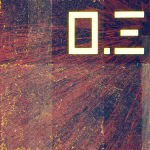Since his debut with The Devil's Trade a decade ago, Hungarian musician Dávid Makó has accustomed us to overwhelming melancholy: his lamentations came from so far away, the tone was so oppressive that even when he was alone with his guitar and banjo, he was already labelled ‘doom folk’. With his previous album, Vidékek Vannak Idebenn, The Devil's Trade expanded its sound, notably with the addition of drums, veering towards a dark, heavy rock. Nincs Szennyezetlen Szép continues further in this direction. Were you already finding The Devil's Trade tormented and poignant? Prepare to be shaken up.
In Hungarian, the title of this new album means ‘there is no uncontaminated beauty’: everything is inevitably tainted by darkness and death, as depicted in the artwork's stunning autumnal landscape and its dying nature in the cold mist. For Makó, this title has a very special meaning: within just two weeks, his mother died and his son was born. This traumatic and emotionally intense experience seems to resonate with tragic irony in the name of the project, The Devil's Trade, the ‘pact with the devil’: you are given one thing, but another is taken away.
The opening track hits us right in the gut, a radical statement of intent. Never before has Makó's singing been so haunting, so sincere, so full of suffering that he tears himself apart, scraping his soul while ripping out his guts. The sound explodes, The Devil's Trade embraces a doom/post-metal mix with abyssal depths. Moving forward in time, Makó seems to look back and return to the metal of his previous project, HAW, but here stripped of all its recreational energy, stripped of the Americana touches that were still evident at the time of The Call of the Iron Peak and mixed with traditional Hungarian influences. He confesses that The Sleep That Dragged You Away was the most difficult and therefore the most liberating song of his life so far, causing him to suffer a nervous breakdown.
The Devil's Trade loses itself in the fog and wanders among the graves, screaming its pain in a devastating personal labyrinth. From the very first track, the album immerses us completely and sweeps us away in an intense whirlwind of grief and regret. Makó holds nothing back, spares no effort, and shows no false modesty. It is mercilessly sincere, oscillating between anger and absolute sadness. There are works that are haunted by grief in a palpable way. We are used to hearing this in older artists, such as on the last albums by Johnny Cash, David Bowie and Leonard Cohen, which were overshadowed by the imminent death of their creators, or on the deeply moving Skeleton Tree recorded by Nick Cave after the death of his son. There is a vulnerability in The Devil's Trade, a need to exorcise all these torments, something that cannot be feigned and that transpires from every track on Nincs Szennyezetlen Szép.
Somewhere between Antimatter's elegant melancholy and Amenra's cathartic rituals that sublimate suffering, The Devil's Trade overwhelms and intimidates us, but above all, shares with us unreservedly. The crescendo and discreet melodic progression of Weltschmerz, literally ‘the pain of the world’ but simply translated as ‘melancholy’, leaves us in the company of All This Sadness, an atmospheric transition, as if no words could be put on certain sorrows. This silence eventually explodes into anger spat out like a survival reflex with All This Sadness Will Be Gone. The Devil's Trade's music has taken on a new dimension, a depth that does justice to its intensity and the violence of the storms that drive it.
While Makó's voice, as rich and deep as ever, serves as the main vehicle for emotion, The Devil's Trade also takes the time to let its tracks breathe. This allows the listener to immerse themselves in a world of greyness, cold, mist, dead leaves and spectres. The result is a constant tension, with lulls serving only as the surface beneath which a storm is brewing, ready to explode, as in the repeated ‘without you I'm free’ in Your Pieces Scattered or the more minimalist, folk-inspired first part of the title track... Fleeting, contemplative pauses before crushing riffs tear us to shreds.
Is Nincs Szennyezetlen Szép the ascent of a mountain of suffering or, on the contrary, a subterranean dive into the depths of torment? We'll leave it up to you to decide which direction it inspires you to take. But this is The Devil's Trade's strongest and most haunting album, an honest exploration of grief with rare power. There may be no immaculate beauty, perhaps death still lurks in the background, ready to cast a shadow over the picture... But as the terrifying echoes from beyond the grave of Idegen Minden reach us and leave us in the solitude of November, we can only conclude that from this darkness, The Devil's Trade has brought forth a unique beauty.





